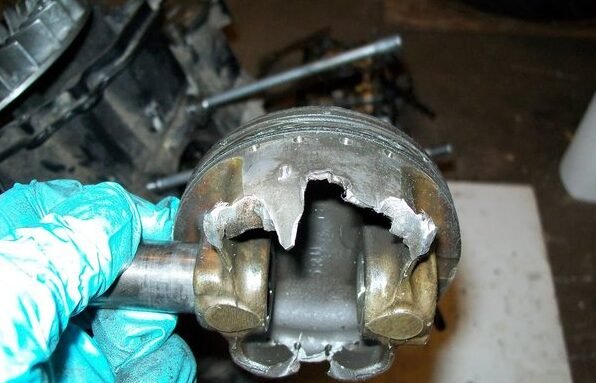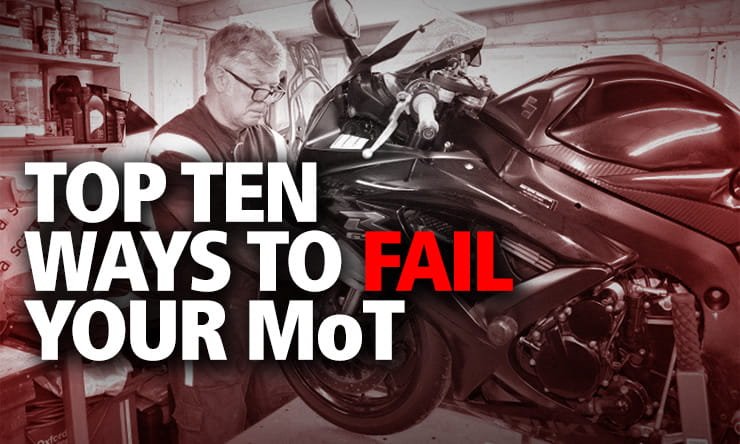When a motorcycle runs out of oil, the engine can overheat and seize due to increased friction. This can lead to significant engine damage or failure.
Ensuring a smooth ride and the longevity of your motorcycle hinges on maintaining an adequate oil level. Oil in a motorcycle functions as a vital lubricant, keeping the moving parts of an engine operating with minimal friction. A well-lubricated engine not only performs better but also has a longer lifespan.
Neglecting oil levels can spell disaster for any rider. Running out of oil forces the engine to work harder, escalating wear and tear on components. This situation might even culminate in a breakdown, leaving you stranded.
With oil being the lifeblood of your motorcycle’s engine, regular checks and timely changes are important for a hassle-free ride. Prioritizing this simple yet essential aspect of motorcycle maintenance ensures you’re never caught off guard by oil-related engine troubles.
Table of Contents
What Is The Role Of Oil In Motorcycle Engines
Motorcycle engines depend on oil for their performance and longevity. Oil serves critical functions, enabling engines to run smoothly and efficiently. A motorcycle without enough oil faces severe risks. Let’s explore what oil does for motorcycle engines.
Lubrication: The Lifeline For Moving Parts
Without lubrication, engine parts grind against each other. This friction leads to excessive wear and damage. Oil provides a slippery layer that cushions engine components. It reduces friction and wear, allowing for a smooth ride. Think of oil as a protective barrier that shields vital parts.
Here’s what oil does:
- Reduces metal-to-metal contact between moving parts
- Protects against corrosion by keeping parts coated
- Ensures longevity of the engine’s internal parts
Heat Regulation: Keeping The Engine Cool
Engines generate heat. Oil helps manage this heat by absorbing and dispersing it away from hot areas. Without sufficient oil, engines can overheat. An overheated engine can fail and leave you stranded.
Oil assists in:
- Absorbing heat from engine parts
- Dispersing heat evenly throughout the engine
- Preventing overheating by maintaining temperature

Credit: m.youtube.com
Results If Motorcycle Runs Out Of Oil
Consequences of Oil Depletion on a motorcycle can lead to significant mechanical issues that may result in expensive repairs or even complete engine failure. Knowing these consequences is essential for every rider.
Oil plays a critical role in lubricating engine parts, reducing friction, and dissipating heat. Without it, the engine’s performance drastically deteriorates. Let’s dive into what exactly happens when a motorcycle runs out of oil.
Friction Increase: The Engine’s Enemy
The absence of oil in an engine leads to an immediate increase in friction among the moving parts. This heightened friction can result in:
- Wear and tear of engine components: Metal surfaces rub against each other, causing erosion.
- Decreased performance: As friction mounts, the engine struggles to operate smoothly.
- Potential for seizing: In extreme cases, parts could weld together, stopping the engine completely.
Overheating: When Metal Components Suffer
Beyond friction, lack of oil causes a rapid temperature rise. Overheating can have severe effects, such as:
| Component | Effect of Overheating |
|---|---|
| Cylinder Head | Warping or cracking, leading to costly repairs. |
| Pistons | Expansion and seizing within the cylinder. |
| Engine Block | Irreversible damage, often requiring engine replacement. |
Immediate Effects Of Running Out Of Oil
Oil is like blood for motorcycles; it keeps the engine running smoothly. But what happens if a motorcycle runs out of oil? The immediate effects can be harmful to the bike.
Performance Deterioration: The Warning Signs
When a motorcycle is low on oil, warning signs begin to show. These signs are critical and should never be ignored.
- The engine loses power.
- Riding becomes rough and less responsive.
- Fuel consumption may increase.
- Overheating becomes a common issue.
Noise Elevation: Ticking Time Bomb Of The Engine
A well-lubricated engine runs quietly. Without oil, noises rise from the engine.
The ticking you hear is metal clashing with metal. This sound means the engine suffers.
The noise is a loud alarm signaling an urgent need for oil before the damage gets too severe.
Long-term Damage On Motorcycle Components
Like our bodies need water, motorcycles need oil for survival. Over time, without oil, your motorcycle’s engine suffers.
Running out of oil isn’t just a temporary hiccup; it can lead to long-term damage. This can mean costly repairs or even a complete engine replacement.
Let’s explore how lack of oil causes irreversible damage to your motorcycle’s vital components.
Engine Wear And Tear: Degradation Over Time
Think of oil as a protective guardian for your engine. Without it:
- Heat builds up fast.
- Parts grind against each other.
- Metal surfaces wear down.
Over time, this wear and tear becomes a big problem. You won’t just see it; you’ll hear it in the engine’s knocks and feel it in reduced performance.
Imagine engine components grinding with each other. It’s painful to think about. That’s what happens to your motorcycle without enough oil.
Regular oil checks and changes keep your engine happy and healthy.
Part Failures: When The Damage Is Done
When an engine runs dry, it’s not a matter of if but when parts will fail:
| Component | Function | Damage Without Oil |
|---|---|---|
| Pistons | Power generation | Seize and melt |
| Bearings | Reduce friction | Seize and break |
| Crankshaft | Convert motion | Warp and fail |
Once the damage is done, these parts may not just need repairs. Often, they need complete replacement. This means a big bill and time off the road.
Replacing an engine is pricey. Engine parts like pistons and crankshafts aren’t cheap either.
To save money and avoid breakdowns, keep that oil in check!
Preventive Measures And Maintenance Tips
Running a motorcycle without oil leads to engine damage due to increased friction. Regularly check oil levels and adhere to service schedules to safeguard engine performance and longevity.
Running your motorcycle without oil can have dire consequences. Understanding this, every rider must know the importance of regular maintenance. To avoid costly damage, here’s how you can perform preventive measures for the longevity of your bike’s engine.
Regular Check-ups: The First Line Of Defense
Just like you would visit a doctor to ensure your health, regular check-ups for your motorcycle can save it from bigger issues. Weekly inspections are ideal. Make sure to keep an eye on the oil level and check for any signs of leaks. Inspect the color of the oil too. If it’s dark and dirty, that’s a sign of an oil change.
- Review the oil level: Before every long ride, check the oil sight glass or dipstick.
- Look for leaks: Check underneath the bike for oil spots indicating leakage.
- Analyze the exhaust: White smoke from the exhaust could hint at oil burning.
Oil Change Essentials: Ensuring Engine Health
An oil change is not just about replacing old oil but also about keeping your engine in top shape. Stick to the schedule recommended in your motorcycle’s manual. Different bikes have different needs. Use the grade and type of oil specified for your model.
- Refer to your bike’s manual: Always follow the specific oil type and change intervals.
- Tools and parts: Have the right tools and an oil filter ready before you begin.
- Proper disposal: Disposing of used oil correctly protects the environment.
Beyond the oil change, replace the oil filter every time, as it’s crucial for removing contaminants from the oil. A tip for riders: running your engine for a couple of minutes warms the oil, making it drain faster and cleaner.
Remember: Consistent maintenance reduces the risk of running out of oil. Never ignore the warning signs and be sure to follow these steps. They safeguard your motorcycle so you can enjoy endless road trips without worry.

Credit: www.jdpower.com
Troubleshooting And Solutions For Motorcycle Oil Problems
Oil lubricates engine parts. It prevents overheating. Without it, engines face severe damage. This guide explains common oil issues. It offers practical solutions. Get ready to learn how to identify and fix oil deficiencies.
Recognizing Oil-related Issues
Timely recognition of oil problems can save your motorcycle’s engine. Look out for these signs:
- Engine Noise: Listen for knocking or ticking sounds.
- Oil Pressure Light: It illuminates when oil is low.
- Excessive Heat: Engines run hotter with low oil.
- Visible Smoke: Smoke indicates burning oil.
Fixing Oil Deficiency: Steps To Recovery
The next step is to address the oil deficiency. Here’s what to do:
- Turn Off the Engine: Prevent further damage immediately.
- Check Oil Level: Use the dipstick to gauge oil level.
- Add Oil: If low, fill to the recommended level.
- Inspect for Leaks: Search for oil on the ground or engine parts.
- Consult a Mechanic: Persistent issues require professional help.
FAQ
Can A Motorcycle Engine Seize Without Oil?
Yes, without oil, a motorcycle engine faces increased friction. This can cause the engine components to weld together and seize, often beyond repair. Regular oil checks are crucial for engine longevity.
What Are Signs Of Low Oil In Motorcycles?
Signs include increased engine noise, overheating, poor performance, and the oil pressure light illuminating. It’s essential to check oil levels regularly and refill as needed to avoid damage.
How Long Can A Motorcycle Run With Low Oil?
Running a motorcycle on low oil is risky and can cause damage within a few minutes. Engines depend on oil for lubrication and cooling. It’s critical to stop the bike and check oil levels immediately if you suspect they’re low.
What Immediate Steps Should Be Taken If A Motorcycle Runs Out Of Oil?
Immediately turn off the engine to prevent further damage. Do not run the engine until it has been properly refilled with the correct type of oil. Have the motorcycle inspected by a professional mechanic before using it again.
Bottom Line
Running out of oil spells disaster for any motorcycle engine. It leads to increased friction, overheating, and potential engine seizure. To avoid costly repairs and ensure your ride’s longevity, regular oil checks are essential. Safeguard your motorcycle’s health by maintaining its lifeblood — engine oil.




Leave a Reply